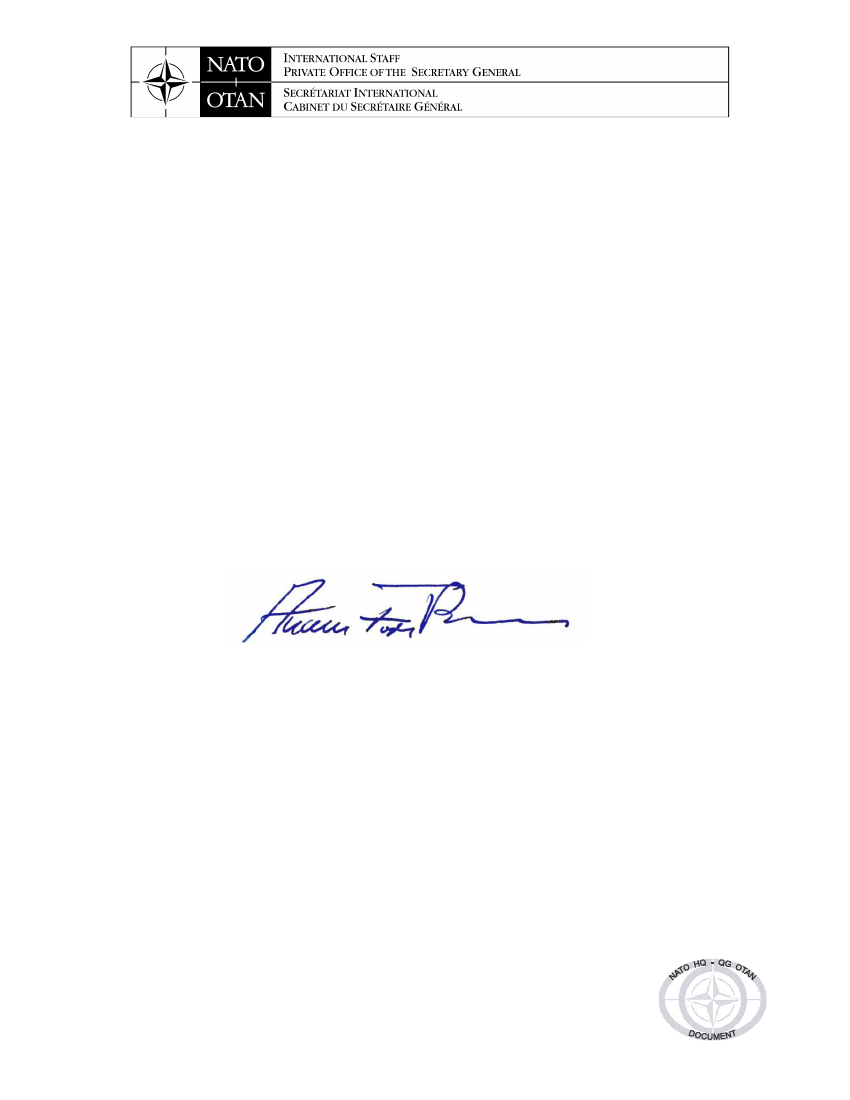Det Udenrigspolitiske Nævn 2010-11 (1. samling)
UPN Alm.del Bilag 24
Offentligt
NATO UNCLASSIFIED
19 November 2010
DOCUMENTPO(2010)0169
To:From:
Permanent Representatives (Council)Secretary General
THE ALLIANCE’S STRATEGIC CONCEPT
I herewith circulate for the record the Alliance’s updated Strategic Concept asapproved by the Alliance’s Heads of State and Government at their meeting inLisbon on 19 November 2010.
Anders Fogh Rasmussen
Original: English1 Annex
DMS 1820534
NATO UNCLASSIFIED-1-
NATO UNCLASSIFIEDANNEX toPO(2010)0169“Strategic ConceptFor the Defence and Security of The Members of the North Atlantic TreatyOrganisation”Adopted by Heads of State and Government in Lisbon
Active Engagement, Modern DefencePreface
We, the Heads of State and Government of the NATO nations, are determinedthat NATO will continue to play its unique and essential role in ensuring our commondefence and security. This Strategic Concept will guide the next phase in NATO’sevolution, so that it continues to be effective in a changing world, against newthreats, with new capabilities and new partners:It reconfirms the bond between our nations to defend one another againstattack, including against new threats to the safety of our citizens.It commits the Alliance to prevent crises, manage conflicts and stabilize post-conflict situations, including by working more closely with our internationalpartners, most importantly the United Nations and the European Union.It offers our partners around the globe more political engagement with theAlliance, and a substantial role in shaping the NATO-led operations to whichthey contribute.It commits NATO to the goal of creating the conditions for a world withoutnuclear weapons – but reconfirms that, as long as there are nuclear weaponsin the world, NATO will remain a nuclear Alliance.It restates our firm commitment to keep the door to NATO open to allEuropean democracies that meet the standards of membership, becauseenlargement contributes to our goal of a Europe whole, free and at peace.It commits NATO to continuous reform towards a more effective, efficient andflexible Alliance, so that our taxpayers get the most security for the moneythey invest in defence.
The citizens of our countries rely on NATO to defend Allied nations, to deployrobust military forces where and when required for our security, and to helppromote common security with our partners around the globe. While the world ischanging, NATO’s essential mission will remain the same: to ensure that theAlliance remains an unparalleled community of freedom, peace, security andshared values.
NATO UNCLASSIFIED1-1
NATO UNCLASSIFIEDANNEX toPO(2010)0169
***Core Tasks and Principles1. NATO’s fundamental and enduring purpose is to safeguard the freedom andsecurity of all its members by political and military means. Today, the Allianceremains an essential source of stability in an unpredictable world.2. NATO member states form a unique community of values, committed to theprinciples of individual liberty, democracy, human rights and the rule of law. TheAlliance is firmly committed to the purposes and principles of the Charter of theUnited Nations, and to the Washington Treaty, which affirms the primaryresponsibility of the Security Council for the maintenance of international peaceand security.3. The political and military bonds between Europe and North America have beenforged in NATO since the Alliance was founded in 1949; the transatlantic linkremains as strong, and as important to the preservation of Euro-Atlantic peaceand security, as ever. The security of NATO members on both sides of theAtlantic is indivisible. We will continue to defend it together, on the basis ofsolidarity, shared purpose and fair burden-sharing.4. The modern security environment contains a broad and evolving set ofchallenges to the security of NATO’s territory and populations. In order to assuretheir security, the Alliance must and will continue fulfilling effectively threeessential core tasks, all of which contribute to safeguarding Alliance members,and always in accordance with international law:a.Collective defence.NATO members will always assist each otheragainst attack, in accordance with Article 5 of the Washington Treaty.That commitment remains firm and binding. NATO will deter anddefend against any threat of aggression, and against emerging securitychallenges where they threaten the fundamental security of individualAllies or the Alliance as a whole.b.Crisis management.NATO has a unique and robust set of politicaland military capabilities to address the full spectrum of crises – before,during and after conflicts. NATO will actively employ an appropriatemix of those political and military tools to help manage developingcrises that have the potential to affect Alliance security, before theyescalate into conflicts; to stop ongoing conflicts where they affectAlliance security; and to help consolidate stability in post-conflictsituations where that contributes to Euro-Atlantic security.c.Cooperative security.The Alliance is affected by, and can affect,political and security developments beyond its borders. The Alliancewill engage actively to enhance international security, throughpartnership with relevant countries and other internationalorganisations; by contributing actively to arms control, non-proliferationNATO UNCLASSIFIED1-2
NATO UNCLASSIFIEDANNEX toPO(2010)0169and disarmament; and by keeping the door to membership in theAlliance open to all European democracies that meet NATO’sstandards.
5. NATO remains the unique and essential transatlantic forum for consultations onall matters that affect the territorial integrity, political independence and securityof its members, as set out in Article 4 of the Washington Treaty. Any securityissue of interest to any Ally can be brought to the NATO table, to shareinformation, exchange views and, where appropriate, forge common approaches.6. In order to carry out the full range of NATO missions as effectively and efficientlyas possible, Allies will engage in a continuous process of reform, modernisationand transformation.
The Security Environment7. Today, the Euro-Atlantic area is at peace and the threat of a conventional attackagainst NATO territory is low. That is an historic success for the policies of robustdefence, Euro-Atlantic integration and active partnership that have guided NATOfor more than half a century.8. However, the conventional threat cannot be ignored. Many regions and countriesaround the world are witnessing the acquisition of substantial, modern militarycapabilities with consequences for international stability and Euro-Atlanticsecurity that are difficult to predict. This includes the proliferation of ballisticmissiles, which poses a real and growing threat to the Euro-Atlantic area.9. The proliferation of nuclear weapons and other weapons of mass destruction,and their means of delivery, threatens incalculable consequences for globalstability and prosperity. During the next decade, proliferation will be most acutein some of the world’s most volatile regions.10. Terrorism poses a direct threat to the security of the citizens of NATO countries,and to international stability and prosperity more broadly. Extremist groupscontinue to spread to, and in, areas of strategic importance to the Alliance, andmodern technology increases the threat and potential impact of terrorist attacks,in particular if terrorists were to acquire nuclear, chemical, biological orradiological capabilities.11. Instability or conflict beyond NATO borders can directly threaten Alliance security,including by fostering extremism, terrorism, and trans-national illegal activitiessuch as trafficking in arms, narcotics and people.12. Cyber attacks are becoming more frequent, more organised and more costly inthe damage that they inflict on government administrations, businesses,economies and potentially also transportation and supply networks and otherNATO UNCLASSIFIED1-3
NATO UNCLASSIFIEDANNEX toPO(2010)0169critical infrastructure; they can reach a threshold that threatens national andEuro-Atlantic prosperity, security and stability. Foreign militaries and intelligenceservices, organised criminals, terrorist and/or extremist groups can each be thesource of such attacks.13. All countries are increasingly reliant on the vital communication, transport andtransit routes on which international trade, energy security and prosperitydepend. They require greater international efforts to ensure their resilienceagainst attack or disruption. Some NATO countries will become more dependenton foreign energy suppliers and in some cases, on foreign energy supply anddistribution networks for their energy needs. As a larger share of worldconsumption is transported across the globe, energy supplies are increasinglyexposed to disruption.14. A number of significant technology-related trends – including the development oflaser weapons, electronic warfare and technologies that impede access to space– appear poised to have major global effects that will impact on NATO militaryplanning and operations.15. Key environmental and resource constraints, including health risks, climatechange, water scarcity and increasing energy needs will further shape the futuresecurity environment in areas of concern to NATO and have the potential tosignificantly affect NATO planning and operations.
Defence and Deterrence16. The greatest responsibility of the Alliance is to protect and defend our territoryand our populations against attack, as set out in Article 5 of the WashingtonTreaty. The Alliance does not consider any country to be its adversary. However,no one should doubt NATO’s resolve if the security of any of its members were tobe threatened.17. Deterrence, based on an appropriate mix of nuclear and conventionalcapabilities, remains a core element of our overall strategy. The circumstances inwhich any use of nuclear weapons might have to be contemplated are extremelyremote. As long as nuclear weapons exist, NATO will remain a nuclear alliance.18. The supreme guarantee of the security of the Allies is provided by the strategicnuclear forces of the Alliance, particularly those of the United States; theindependent strategic nuclear forces of the United Kingdom and France, whichhave a deterrent role of their own, contribute to the overall deterrence andsecurity of the Allies.19. We will ensure that NATO has the full range of capabilities necessary to deterand defend against any threat to the safety and security of our populations.Therefore, we will:
NATO UNCLASSIFIED1-4
NATO UNCLASSIFIEDANNEX toPO(2010)0169maintain an appropriate mix of nuclear and conventional forces;maintain the ability to sustain concurrent major joint operations andseveral smaller operations for collective defence and crisis response,including at strategic distance;develop and maintain robust, mobile and deployable conventionalforces to carry out both our Article 5 responsibilities and the Alliance’sexpeditionary operations, including with the NATO Response Force;carry out the necessary training, exercises, contingency planning andinformation exchange for assuring our defence against the full range ofconventional and emerging security challenges, and provideappropriate visible assurance and reinforcement for all Allies;ensure the broadest possible participation of Allies in collective defenceplanning on nuclear roles, in peacetime basing of nuclear forces, and incommand, control and consultation arrangements;develop the capability to defend our populations and territories againstballistic missile attack as a core element of our collective defence,which contributes to the indivisible security of the Alliance. We willactively seek cooperation on missile defence with Russia and otherEuro-Atlantic partners;further develop NATO’s capacity to defend against the threat ofchemical, biological, radiological and nuclear weapons of massdestruction;develop further our ability to prevent, detect, defend against andrecover from cyber-attacks, including by using the NATO planningprocess to enhance and coordinate national cyber-defence capabilities,bringing all NATO bodies under centralized cyber protection, and betterintegrating NATO cyber awareness, warning and response withmember nations;enhance the capacity to detect and defend against internationalterrorism, including through enhanced analysis of the threat, moreconsultations with our partners, and the development of appropriatemilitary capabilities, including to help train local forces to fight terrorismthemselves;develop the capacity to contribute to energy security, includingprotection of critical energy infrastructure and transit areas and lines,cooperation with partners, and consultations among Allies on the basisof strategic assessments and contingency planning;ensure that the Alliance is at the front edge in assessing the securityimpact of emerging technologies, and that military planning takes thepotential threats into account;sustain the necessary levels of defence spending, so that our armedforces are sufficiently resourced;continue to review NATO’s overall posture in deterring and defendingagainst the full range of threats to the Alliance, taking into accountchanges to the evolving international security environment.
NATO UNCLASSIFIED1-5
NATO UNCLASSIFIEDANNEX toPO(2010)0169
Security through Crisis Management20. Crises and conflicts beyond NATO’s borders can pose a direct threat to thesecurity of Alliance territory and populations. NATO will therefore engage, wherepossible and when necessary, to prevent crises, manage crises, stabilize post-conflict situations and support reconstruction.21. The lessons learned from NATO operations, in particular in Afghanistan and theWestern Balkans, make it clear that a comprehensive political, civilian andmilitary approach is necessary for effective crisis management. The Alliance willengage actively with other international actors before, during and after crises toencourage collaborative analysis, planning and conduct of activities on theground, in order to maximise coherence and effectiveness of the overallinternational effort.22. The best way to manage conflicts is to prevent them from happening. NATO willcontinually monitor and analyse the international environment to anticipate crisesand, where appropriate, take active steps to prevent them from becoming largerconflicts.23. Where conflict prevention proves unsuccessful, NATO will be prepared andcapable to manage ongoing hostilities. NATO has unique conflict managementcapacities, including the unparalleled capability to deploy and sustain robustmilitary forces in the field.NATO-led operations have demonstrated theindispensable contribution the Alliance can make to international conflictmanagement efforts.24. Even when conflict comes to an end, the international community must oftenprovide continued support, to create the conditions for lasting stability. NATO willbe prepared and capable to contribute to stabilisation and reconstruction, in closecooperation and consultation wherever possible with other relevant internationalactors.25. To be effective across the crisis management spectrum, we will:enhance intelligence sharing within NATO, to better predict whencrises might occur, and how they can best be prevented;further develop doctrine and military capabilities for expeditionaryoperations,includingcounterinsurgency,stabilizationandreconstruction operations;form an appropriate but modest civilian crisis management capability tointerface more effectively with civilian partners, building on the lessonslearned from NATO-led operations. This capability may also be used toplan, employ and coordinate civilian activities until conditions allow forthe transfer of those responsibilities and tasks to other actors;enhance integrated civilian-military planning throughout the crisisspectrum,NATO UNCLASSIFIED1-6
NATO UNCLASSIFIEDANNEX toPO(2010)0169develop the capability to train and develop local forces in crisis zones,so that local authorities are able, as quickly as possible, to maintainsecurity without international assistance;identify and train civilian specialists from member states, madeavailable for rapid deployment by Allies for selected missions, able towork alongside our military personnel and civilian specialists frompartner countries and institutions;broaden and intensify the political consultations among Allies, and withpartners, both on a regular basis and in dealing with all stages of acrisis – before, during and after.
Promoting International Security through CooperationArms Control, Disarmament, and Non-Proliferation26. NATO seeks its security at the lowest possible level of forces. Arms control,disarmament and non-proliferation contribute to peace, security and stability, andshould ensure undiminished security for all Alliance members. We will continue toplay our part in reinforcing arms control and in promoting disarmament of bothconventional weapons and weapons of mass destruction, as well as non-proliferation efforts:We are resolved to seek a safer world for all and to create theconditions for a world without nuclear weapons in accordance with thegoals of the Nuclear Non-Proliferation Treaty, in a way that promotesinternational stability, and is based on the principle of undiminishedsecurity for all.With the changes in the security environment since the end of the ColdWar, we have dramatically reduced the number of nuclear weaponsstationed in Europe and our reliance on nuclear weapons in NATOstrategy. We will seek to create the conditions for further reductions inthe future.In any future reductions, our aim should be to seek Russian agreementto increase transparency on its nuclear weapons in Europe andrelocate these weapons away from the territory of NATO members.Any further steps must take into account the disparity with the greaterRussian stockpiles of short-range nuclear weapons.We are committed to conventional arms control, which providespredictability, transparency and a means to keep armaments at thelowest possible level for stability. We will work to strengthen theconventional arms control regime in Europe on the basis of reciprocity,transparency and host-nation consent.We will explore ways for our political means and military capabilities tocontribute to international efforts to fight proliferation.National decisions regarding arms control and disarmament may havean impact on the security of all Alliance members. We are committed to
NATO UNCLASSIFIED1-7
NATO UNCLASSIFIEDANNEX toPO(2010)0169maintain, and develop as necessary, appropriate consultations amongAllies on these issues.
Open Door27. NATO’s enlargement has contributed substantially to the security of Allies; theprospect of further enlargement and the spirit of cooperative security haveadvanced stability in Europe more broadly. Our goal of a Europe whole and free,and sharing common values, would be best served by the eventual integration ofall European countries that so desire into Euro-Atlantic structures.The door to NATO membership remains fully open to all Europeandemocracies which share the values of our Alliance, which are willing andable to assume the responsibilities and obligations of membership, and whoseinclusion can contribute to common security and stability.
Partnerships28. The promotion of Euro-Atlantic security is best assured through a wide network ofpartner relationships with countries and organisations around the globe. Thesepartnerships make a concrete and valued contribution to the success of NATO’sfundamental tasks.29. Dialogue and cooperation with partners can make a concrete contribution toenhancing international security, to defending the values on which our Alliance isbased, to NATO’s operations, and to preparing interested nations for membershipof NATO. These relationships will be based on reciprocity, mutual benefit andmutual respect.30. We will enhance our partnerships through flexible formats that bring NATO andpartners together – across and beyond existing frameworks:We are prepared to develop political dialogue and practical cooperationwith any nations and relevant organisations across the globe that shareour interest in peaceful international relations.We will be open to consultation with any partner country on securityissues of common concern.We will give our operational partners a structural role in shapingstrategy and decisions on NATO-led missions to which they contribute.We will further develop our existing partnerships while preserving theirspecificity.
31. Cooperation between NATO and the United Nations continues to make asubstantial contribution to security in operations around the world. The Allianceaims to deepen political dialogue and practical cooperation with the UN, as setout in the UN-NATO Declaration signed in 2008, including through:NATO UNCLASSIFIED1-8
NATO UNCLASSIFIEDANNEX toPO(2010)0169enhanced liaison between the two Headquarters;more regular political consultation; andenhanced practical cooperation in managing crises where bothorganisations are engaged.
32. An active and effective European Union contributes to the overall security of theEuro-Atlantic area. Therefore the EU is a unique and essential partner for NATO.The two organisations share a majority of members, and all members of bothorganisations share common values. NATO recognizes the importance of astronger and more capable European defence. We welcome the entry into forceof the Lisbon Treaty, which provides a framework for strengthening the EU’scapacities to address common security challenges. Non-EU Allies make asignificant contribution to these efforts. For the strategic partnership betweenNATO and the EU, their fullest involvement in these efforts is essential. NATOand the EU can and should play complementary and mutually reinforcing roles insupporting international peace and security. We are determined to make ourcontribution to create more favourable circumstances through which we will:fully strengthen the strategic partnership with the EU, in the spirit of fullmutual openness, transparency, complementarity and respect for theautonomy and institutional integrity of both organisations;enhance our practical cooperation in operations throughout the crisisspectrum, from coordinated planning to mutual support in the field;broaden our political consultations to include all issues of commonconcern, in order to share assessments and perspectives;cooperate more fully in capability development, to minimise duplicationand maximise cost-effectiveness.
33. NATO-Russia cooperation is of strategic importance as it contributes to creatinga common space of peace, stability and security. NATO poses no threat toRussia. On the contrary: we want to see a true strategic partnership betweenNATO and Russia, and we will act accordingly, with the expectation of reciprocityfrom Russia.34. The NATO-Russia relationship is based upon the goals, principles andcommitments of the NATO-Russia Founding Act and the Rome Declaration,especially regarding the respect of democratic principles and the sovereignty,independence and territorial integrity of all states in the Euro-Atlantic area.Notwithstanding differences on particular issues, we remain convinced that thesecurity of NATO and Russia is intertwined and that a strong and constructivepartnership based on mutual confidence, transparency and predictability can bestserve our security. We are determined to:enhance the political consultations and practical cooperation withRussia in areas of shared interests, including missile defence, counter-terrorism, counter-narcotics, counter-piracy and the promotion of widerinternational security;
NATO UNCLASSIFIED1-9
NATO UNCLASSIFIEDANNEX toPO(2010)0169use the full potential of the NATO-Russia Council for dialogue and jointaction with Russia.
35. The Euro-Atlantic Partnership Council and Partnership for Peace are central toour vision of Europe whole, free and in peace. We are firmly committed to thedevelopment of friendly and cooperative relations with all countries of theMediterranean, and we intend to further develop the Mediterranean Dialogue inthe coming years. We attach great importance to peace and stability in the Gulfregion, and we intend to strengthen our cooperation in the Istanbul CooperationInitiative. We will aim to:enhance consultations and practical military cooperation with ourpartners in the Euro-Atlantic Partnership Council;continue and develop the partnerships with Ukraine and Georgia withinthe NATO-Ukraine and NATO-Georgia Commissions, based on theNATO decision at the Bucharest summit 2008, and taking into accountthe Euro-Atlantic orientation or aspiration of each of the countries;facilitate the Euro-Atlantic integration of the Western Balkans, with theaim to ensure lasting peace and stability based on democratic values,regional cooperation and good neighbourly relations;deepen the cooperation with current members of the MediterraneanDialogue and be open to the inclusion in the Mediterranean Dialogue ofother countries of the region;develop a deeper security partnership with our Gulf partners andremain ready to welcome new partners in the Istanbul CooperationInitiative.
Reform and Transformation36. Unique in history, NATO is a security Alliance that fields military forces able tooperate together in any environment; that can control operations anywherethrough its integrated military command structure; and that has at its disposalcore capabilities that few Allies could afford individually.37. NATO must have sufficient resources – financial, military and human – to carryout its missions, which are essential to the security of Alliance populations andterritory. Those resources must, however, be used in the most efficient andeffective way possible. We will:maximise the deployability of our forces, and their capacity to sustainoperations in the field, including by undertaking focused efforts to meetNATO’s usability targets;ensure the maximum coherence in defence planning, to reduceunnecessary duplication, and to focus our capability development onmodern requirements;develop and operate capabilities jointly, for reasons of cost-effectiveness and as a manifestation of solidarity;
NATO UNCLASSIFIED1-10
NATO UNCLASSIFIEDANNEX toPO(2010)0169preserve and strengthen the common capabilities, standards,structures and funding that bind us together;engage in a process of continual reform, to streamline structures,improve working methods and maximise efficiency.
An Alliance for the 21stCentury38. We, the political leaders of NATO, are determined to continue renewal of ourAlliance so that it is fit for purpose in addressing the 21stCentury securitychallenges. We are firmly committed to preserve its effectiveness as the globe’smost successful political-military Alliance. Our Alliance thrives as a source ofhope because it is based on common values of individual liberty, democracy,human rights and the rule of law, and because our common essential andenduring purpose is to safeguard the freedom and security of its members. Thesevalues and objectives are universal and perpetual, and we are determined todefend them through unity, solidarity, strength and resolve.
NATO UNCLASSIFIED1-11












